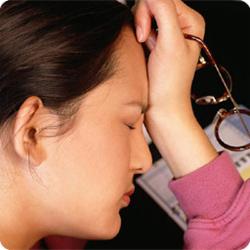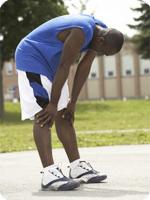Deficient diets Did you know that we get our energy from complex carbohydrates, fat and protein in our diet, and that we need a certain balance of the three to be healthy and energetic? It’s true. Certain kinds of energy come from each of the three and we need it all. When we don’t get this good balance, we can easily become fatigued. So if you constantly go on low-calorie, low-carb, low-fat diets, you’re robbing your body of the things it needs to generate energy. No wonder you get tired easily! Approximately 50% of your calories should come from complex carbohydrates, about 30% from good fats, and approximately 20% from lean protein sources. So, what exactly does this mean? 50% complex carbs: half of each meal should contain a variety of vegetables, or bread, or whole-grain rice, oatmeal, whole grains or peas. 30% good fats: two-thirds of the other half of your meal should contain good, healthy fats like cold-water baked fish, or nuts, or olive oil or peanut oil. 20% lean protein: the final one-third of the meal should include meat, or eggs, or avocado, or nuts or beans. And bear in mind that you should eat all of these foods in the right portion size. Try eating a healthy, balanced diet for a week or two and take note of the difference in your energy levels.
The sugar addiction While sugar is considered a carbohydrate, refined white sugar is a simple carbohydrate and has no food value. The kind of sugar our bodies need for energy is found in fruits, vegetables and some grains. They contain natural sugar that the body breaks down and converts to glucose, or blood sugar. When sugar is refined and processed, it loses any and all of its healthy components. If that isn’t bad enough, refined white sugar actually causes damage to the body. This kind of sugar practically goes straight into the bloodstream, flooding it with more glucose than it can use, which is why you get that false burst of energy, but soon after there’s a let down (fatigue) and your body craves more. And what do you think happens to the excessive glucose in your body from sugar? It is turned into fat that gets stored. A better alternative is to get your sugar from fresh fruits and vegetables. These natural sugars are absorbed more slowly, are loaded with nutrients and fiber and give you ‘real’ energy.
Excessive workouts Excessive exercise is as bad as no exercise. A recent study has shown that almost 25% of individuals who follow an exercise regimen at the gym exercise at excessive levels that can be harmful to their health. On the other hand, researchers at the University of Georgia report than a new study found that healthy adults who complain of being tired all the time got an energy boost from doing low-intensity workouts three times a week. Keeping up this routine will help increase levels of energy (a gentle workout), and will not over-tax you.
Excessive weight Being overweight or obese means you have more body-fat than is healthy. This can cause you to feel tired all the time and/or tire easily when you try to do normal daily activities. In addition, your body has to work harder at everything you do, and this also puts a strain on your heart. Another potential problem with being overweight or obese is it can cause sleep apnea, which can ultimately be fatal. There are many websites you can check to find out what your BMI is to see where you are. By simply making small changes to your diet (smaller portions, more fruit and vegetables and less fast food and processed foods), getting some exercise (you don’t have to join a gym – just take a walk everyday), and drinking more water (dehydration causes fatigue), you can lose weight gradually and safely. Note: taking in excessive caffeine contributes to your fatigue, so cut back on caffeine as well. Once you do this, you’ll notice a rise in your energy level.
Work overload Most people nowadays try to do too many things 24/7 and the result is constant fatigue. Multi-tasking has become the norm for our society. It’s true that we do seem to have more to do than our ancestors, but a lot of this ‘work/play’ is something we chose and added to our already full schedules – it’s not necessarily necessary. If you tire easily, or are tired all the time, take an honest look at your activities on a daily/weekly/monthly basis and decide what’s necessary, what’s important, what you can give up, and what you can delegate. Carve out plenty of time for true relaxation (rest!), simplify your schedule and multi-task in an efficient way. Your reward will be less stress and less fatigue.
Colors have an effect I’m sure you’ve heard that different colors have an emotional effect on people, but did you know that colors can make you feel tired or energetic? In several studies, it was shown that dark colors can make you feel more tired, and light colors can make you feel more relaxed and energetic. Try wearing light-colored clothing instead of dark-colored and see if you notice a difference. You might be surprised.
Tiring easily or being tired all the time is something you can do something about. It’s as simple as taking a look at the points in this article and checking them against your lifestyle. And remember that tiredness is often due to a combination of things that are physical as well as emotional. If you make some changes in your lifestyle and give it a few weeks without noticing any difference, it would be a good idea to check with your physician to see if something else is going on.





